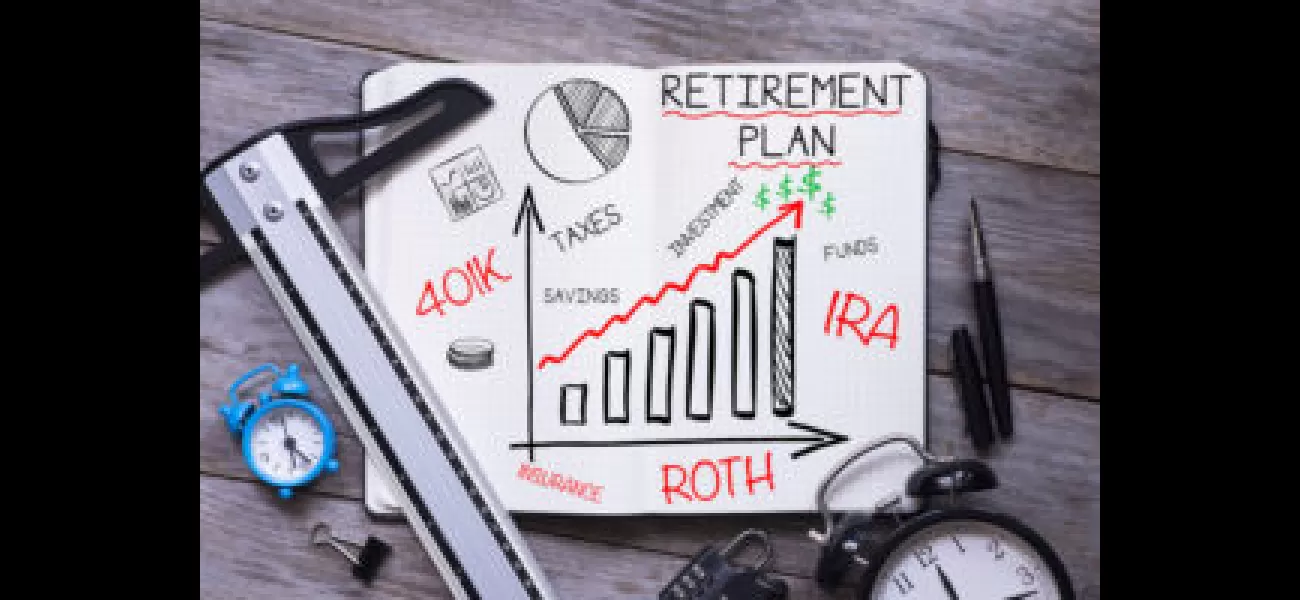Are Backdoor Roth IRAs a good idea?
The writer reflects on their recent experience with backdoor Roth IRAs and shares an overview of how they work, ultimately questioning if they provide as much tax savings as expected.
April 2nd 2024.

Have you ever wondered about the benefits of a backdoor Roth IRA? As a tax accountant, I've signed the last ten individual tax returns which all included a backdoor Roth IRA. This got me thinking - how much tax do you really save with a backdoor Roth? The answer may not be as much as you hope.
But before we dive into the details, let's start with an overview of how Roth IRAs work. A Roth IRA is a special version of an individual retirement account where you contribute money without receiving a tax deduction. However, if you follow the rules, you won't have to pay taxes on your Roth IRA's earnings or when you withdraw funds from the account.
What's even better? When you retire, you won't have to pay income taxes on the money you contributed or the profits earned from your investments over the years. This all sounds great, but not every taxpayer is eligible to contribute to a Roth IRA. In 2023, a single taxpayer can't earn more than $138,000 and a married couple can't earn more than $218,000 to make a full Roth IRA contribution. As you cross these income limits, the amount you can contribute to a Roth IRA decreases.
That's where the backdoor Roth IRA comes in. This strategy allows high-income taxpayers to contribute to a non-deductible IRA and then convert it to a Roth IRA, bypassing the income limits mentioned earlier. However, there's a catch - you must not have any traditional non-Roth IRA balances in order to avoid paying income taxes on the conversion.
But here's the thing - the backdoor Roth IRA may not save you as much tax in the long run as you may think. Most people don't see significant tax savings during their working years using a Roth IRA or a backdoor Roth IRA. Let's take a look at the numbers for a taxpayer aged 49 or younger who can contribute $6,500 to a backdoor Roth IRA in 2023 and avoid paying taxes on the earnings.
Assuming a 5% annual return, the $6,500 contribution may earn $325 in the first year. However, if you had invested that money outside of a Roth IRA, you wouldn't have been taxed on the full $325. Rather, you would only be taxed on the dividends and realized capital gains, which may be taxed at a lower rate. And for most taxpayers, this amount would be so small that they wouldn't even have to pay taxes on it.
But let's say you're subject to a 15% qualified dividend tax rate, which applies to married individuals making more than $123,500 in 2024. In that case, your first-year tax savings would be around $18. Over time, this amount grows, and after two decades of steady backdoor Roth IRA contributions, you may save around $500 to $600 in taxes annually. While this may seem like a good amount, it may not be worth paying an accountant or financial planner to help you achieve these modest savings.
However, the back-end tax savings of a Roth IRA may be more significant. When you use a Roth IRA, you won't have to pay income taxes on the money you withdraw during retirement. For example, if you save $6,500 annually for 20 years and earn a 5% return, your Roth IRA balance would be around $226,000, while a taxable account would have a balance of $219,000. But here's the difference - the Roth IRA investor can withdraw the entire $227,000 without paying taxes, while the taxable account investor may have to pay taxes on the unrealized gains in the account. This could result in a tax bill of around $8,000 to $13,000 for high-income taxpayers.
However, it's worth noting that most people, especially in retirement, may not have to pay taxes on the gains in their taxable account. They may be able to spread the realization of the gain over a few years, use some of the funds for charitable contributions, or leave the money to their heirs, avoiding taxes altogether.
In conclusion, while the backdoor Roth IRA may be a good strategy for some high-income taxpayers, it may not be as compelling for everyone. It's essential to consider your individual financial situation and future expectations before deciding whether a backdoor Roth IRA is the right choice for you. And if you do decide to go for it, it's best to think of it as a long-term strategy rather than a short-term solution. And don't forget to check out our other blog posts on the different types of Roth-style accounts for more insights.
But before we dive into the details, let's start with an overview of how Roth IRAs work. A Roth IRA is a special version of an individual retirement account where you contribute money without receiving a tax deduction. However, if you follow the rules, you won't have to pay taxes on your Roth IRA's earnings or when you withdraw funds from the account.
What's even better? When you retire, you won't have to pay income taxes on the money you contributed or the profits earned from your investments over the years. This all sounds great, but not every taxpayer is eligible to contribute to a Roth IRA. In 2023, a single taxpayer can't earn more than $138,000 and a married couple can't earn more than $218,000 to make a full Roth IRA contribution. As you cross these income limits, the amount you can contribute to a Roth IRA decreases.
That's where the backdoor Roth IRA comes in. This strategy allows high-income taxpayers to contribute to a non-deductible IRA and then convert it to a Roth IRA, bypassing the income limits mentioned earlier. However, there's a catch - you must not have any traditional non-Roth IRA balances in order to avoid paying income taxes on the conversion.
But here's the thing - the backdoor Roth IRA may not save you as much tax in the long run as you may think. Most people don't see significant tax savings during their working years using a Roth IRA or a backdoor Roth IRA. Let's take a look at the numbers for a taxpayer aged 49 or younger who can contribute $6,500 to a backdoor Roth IRA in 2023 and avoid paying taxes on the earnings.
Assuming a 5% annual return, the $6,500 contribution may earn $325 in the first year. However, if you had invested that money outside of a Roth IRA, you wouldn't have been taxed on the full $325. Rather, you would only be taxed on the dividends and realized capital gains, which may be taxed at a lower rate. And for most taxpayers, this amount would be so small that they wouldn't even have to pay taxes on it.
But let's say you're subject to a 15% qualified dividend tax rate, which applies to married individuals making more than $123,500 in 2024. In that case, your first-year tax savings would be around $18. Over time, this amount grows, and after two decades of steady backdoor Roth IRA contributions, you may save around $500 to $600 in taxes annually. While this may seem like a good amount, it may not be worth paying an accountant or financial planner to help you achieve these modest savings.
However, the back-end tax savings of a Roth IRA may be more significant. When you use a Roth IRA, you won't have to pay income taxes on the money you withdraw during retirement. For example, if you save $6,500 annually for 20 years and earn a 5% return, your Roth IRA balance would be around $226,000, while a taxable account would have a balance of $219,000. But here's the difference - the Roth IRA investor can withdraw the entire $227,000 without paying taxes, while the taxable account investor may have to pay taxes on the unrealized gains in the account. This could result in a tax bill of around $8,000 to $13,000 for high-income taxpayers.
However, it's worth noting that most people, especially in retirement, may not have to pay taxes on the gains in their taxable account. They may be able to spread the realization of the gain over a few years, use some of the funds for charitable contributions, or leave the money to their heirs, avoiding taxes altogether.
In conclusion, while the backdoor Roth IRA may be a good strategy for some high-income taxpayers, it may not be as compelling for everyone. It's essential to consider your individual financial situation and future expectations before deciding whether a backdoor Roth IRA is the right choice for you. And if you do decide to go for it, it's best to think of it as a long-term strategy rather than a short-term solution. And don't forget to check out our other blog posts on the different types of Roth-style accounts for more insights.
[This article has been trending online recently and has been generated with AI. Your feed is customized.]
[Generative AI is experimental.]
0
0
Submit Comment





